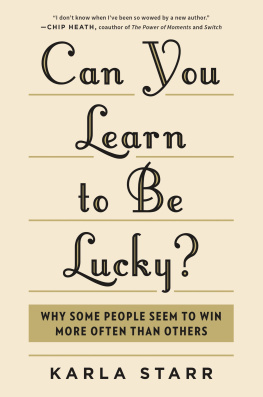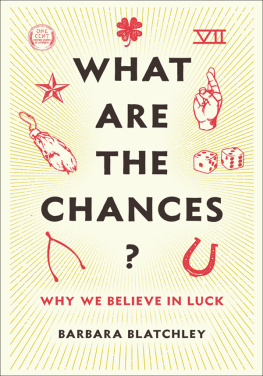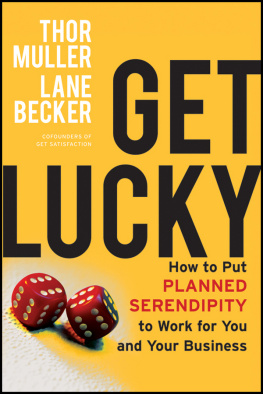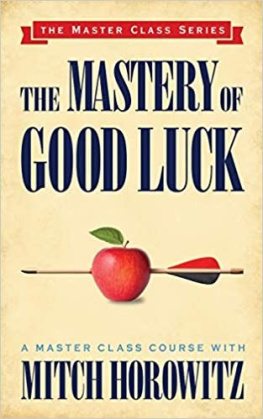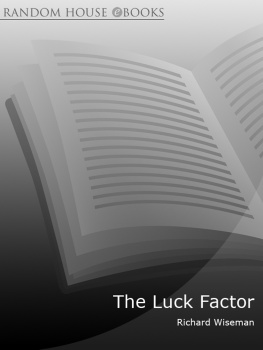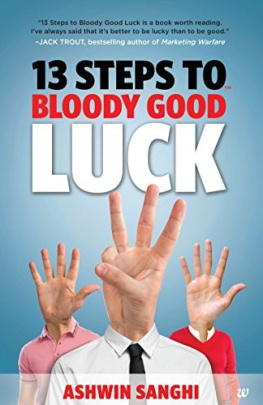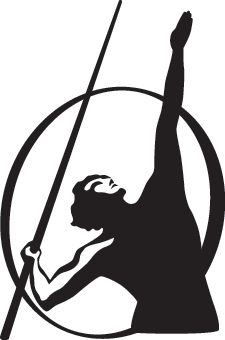Penguin supports copyright. Copyright fuels creativity, encourages diverse voices, promotes free speech, and creates a vibrant culture. Thank you for buying an authorized edition of this book and for complying with copyright laws by not reproducing, scanning, or distributing any part of it in any form without permission. You are supporting writers and allowing Penguin to continue to publish books for every reader.
While the author has made every effort to provide accurate telephone numbers, internet addresses, and other contact information at the time of publication, neither the publisher nor the author assumes any responsibility for errors, or for changes that occur after publication. Further, the publisher does not have any control over and does not assume any responsibility for author or third-party websites or their content.
INTRODUCTION
What We Talk about When We Talk about Luck
In January 2003, my friend Jordan and I were two of the thirty-five hundred people in Homer, Alaska. When we moved there, we wanted to be surrounded by snow and nothingness and beauty and dreamed of watching the northern lights on a nightly basis. But after several months of peeing our pants with excitement whenever the temperature hit the double digits, we would have slaughtered the mailman for the chance to leave for a bit. Jordan was lucky; all he had to do was call his rich mother to get some money to travel.
While Jordan was away, I agreed to leave the big farmhouse where I lived with four others and take care of his cabin, truck, and new puppy for two weeks. Lucky.
After driving four hours from Homer to the Anchorage airport, Jordan hopped out at the unloading zone. Leaving the engine running, he grabbed his black duffel bag and camera equipment from the bed of the pickup and gestured for me to slide over to the drivers seat.
He leaned in. Theres cheese in the fridge, that big brick of cheddar. Its still good. And theres plenty of dog food for the puppy. And lettuce, I think. And beer.
You said you were going to leave me food for the two weeks. And pay for gas for the truck. Its on empty. I unearthed my wallet to show him the $5 bill and lack of a credit card.
Yeah, about that, he said, his eyes shifting toward the terminal. Listen, my plane is about to leave. He gave me a pair of twenties for gas. My nostrils flared. Unlucky.
I stopped for the traditional Alaskan refill of gas and Taco Bell, then left and took to the road. Within minutes, signs of sprawl and chain stores gave way to snowcapped mountains and earnest moose-crossing signs. The sky was cornflower blue, crisp, and cloudless; the road was clear. I thought about spending the next two weeks in Jordans cabin taking care of his puppy and editing the novel Id finished writing the week before. Lucky.
And then life happened.
I veered around a wide bend and down a hill onto a section of the road that some damn omnipresent trees were protecting from the sun. The entire stretch of asphalt before me morphed into ice.
Despite the plentiful experience driving on ice that accompanied learning how to drive in my hometown of Buffalo, I could tell that this time was different. I couldnt do anything. Something was wrong.
Time stood still; the truck did not.
The rear end fishtailed until the truck was perpendicular to the road and started flipping. The world and horizon spun around me. The highway appeared to my left, where the window should have been. Random dents in the door and windshield arrived, uninvited. Shattered glass joined me, spinning around in the cabin. I stuck out my hand to protect my head, and the bones in my wrist popped out of the skin.
The truck rolled over five times before coming to a rest on the side of the road heading in the opposite direction. I spent half an hour staring at my own bones and blood before an ambulance arrived. A helicopter returned me to Anchorage, where an orthopedic surgeon quickly went to work on my wrist and later liberally used the word shattered, estimating that Id broken it in over thirteen places before fusing it with a plate and six screws.
Its your left hand, at least! people exclaimed, trying to console me. Lucky.
Im left-handed, I replied. Unlucky.
The internal bleeding from my fractured skull collected into a subdural hematoma, a coagulated blood clot placing substantial pressure on the inside of my skull that surgeons removed days later.
I spent the next few months watching Conan OBrien on Vicodin on my mothers couch in California. Without health insuranceI was stupid, young, and on a budget and didnt even know how that would have workedI quickly accumulated over $200,000 in medical bills. I was always tired and in a daze. Everything was bright and loud.
My friend Jordan kept calling and asking me to pay the deductible for his car insurance.
I declared bankruptcy the following year to get rid of my medical debt.
Why did this happen to me? I constantly wondered.
My inquiry was not put to bed by the good folks at State Farm, who concluded (in what was surely a rigorous theological inquiry) that my accident was an act of God. Yes, God could have just sent me a letter saying, Cherish each day! but then I would have needed to find another story to begin this book, and as anyone who knows me can verify, when given the opportunity to do anything in the world, I will always opt for a burger and a nap.
In legalese, an act of Godor damnum fatalerefers to damage caused by an unavoidable, nonhuman entity that can otherwise be referred to as fate. When insurers cant go after someone elses policy, they say its God. From this, we can draw two conclusions: First, insurance companies have been using the Bible to get out of paying claims for centuries. Second, in attributing my accident to an act of God, State Farm really meant that my carnival ride from hell was neither my nor someone elses fault, but something inevitable caused by an extra- or superhuman element. It just happened.
It just happened.
This fact, as you can imagine, was of no comfort whatsoever.
This book is about navigating lifes hidden patterns. While theres no way to account for every variable influencing a situation, this doesnt make the world entirely unpredictable. Enough regularities exist to give us a rough guide to their causes and the best ways to deal with the unforeseeable. Randomness is a poor teacher. Organisms need to accomplish tasks while adhering to biological laws of energy usagesucceeding as lazily as possiblewhich evolution has accounted for by shaping the brain into an efficient, action-oriented predictor.

